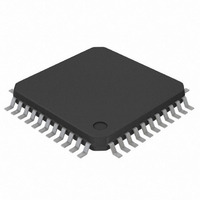PIC16F777-I/PT Microchip Technology, PIC16F777-I/PT Datasheet - Page 477

PIC16F777-I/PT
Manufacturer Part Number
PIC16F777-I/PT
Description
IC PIC MCU FLASH 8KX14 44TQFP
Manufacturer
Microchip Technology
Series
PIC® 16Fr
Datasheets
1.PIC16F616T-ISL.pdf
(8 pages)
2.PIC16F688T-ISL.pdf
(688 pages)
3.PIC16F737-ISP.pdf
(276 pages)
4.PIC16F737-ISP.pdf
(10 pages)
Specifications of PIC16F777-I/PT
Program Memory Type
FLASH
Program Memory Size
14KB (8K x 14)
Package / Case
44-TQFP, 44-VQFP
Core Processor
PIC
Core Size
8-Bit
Speed
20MHz
Connectivity
I²C, SPI, UART/USART
Peripherals
Brown-out Detect/Reset, POR, PWM, WDT
Number Of I /o
36
Ram Size
368 x 8
Voltage - Supply (vcc/vdd)
4 V ~ 5.5 V
Data Converters
A/D 14x10b
Oscillator Type
Internal
Operating Temperature
-40°C ~ 85°C
Processor Series
PIC16F
Core
PIC
Data Bus Width
8 bit
Data Ram Size
368 B
Interface Type
AUSART, CCP, I2C, MSSP, SPI
Maximum Clock Frequency
20 MHz
Number Of Programmable I/os
36
Number Of Timers
3
Operating Supply Voltage
4 V to 5.5 V
Maximum Operating Temperature
+ 85 C
Mounting Style
SMD/SMT
3rd Party Development Tools
52715-96, 52716-328, 52717-734
Development Tools By Supplier
ICE2000, DM163022
Minimum Operating Temperature
- 40 C
On-chip Adc
10 bit
Lead Free Status / RoHS Status
Lead free / RoHS Compliant
For Use With
XLT44PT3 - SOCKET TRAN ICE 44MQFP/TQFPI3DBF777 - BOARD DAUGHTER ICEPIC3AC164305 - MODULE SKT FOR PM3 44TQFP444-1001 - DEMO BOARD FOR PICMICRO MCUAC164020 - MODULE SKT PROMATEII 44TQFP
Eeprom Size
-
Lead Free Status / Rohs Status
Lead free / RoHS Compliant
Available stocks
Company
Part Number
Manufacturer
Quantity
Price
Company:
Part Number:
PIC16F777-I/PT
Manufacturer:
Microchip Technology
Quantity:
10 000
- PIC16F616T-ISL PDF datasheet
- PIC16F688T-ISL PDF datasheet #2
- PIC16F737-ISP PDF datasheet #3
- PIC16F737-ISP PDF datasheet #4
- Current page: 477 of 688
- Download datasheet (3Mb)
1997 Microchip Technology Inc.
Note:
COM0 - SEGx [ON] =
COM0 - SEGx [OFF] =
V
V
D = V
Refer to Figure 25-6
RMS
RMS
V
[ON] =
[OFF] =
RMS
RMS
[ON]
[OFF]
The next example is for Figure 25-6 which is a 1/4 MUX, 1/3 BIAS waveform. For this example,
the values 3, 2, 1 and 0 will be assigned to V
DC voltage, RMS voltage and discrimination ratio calculations are shown in
Example 25-4:
As shown in these examples, static displays have excellent contrast. The higher the multiplex
ratio of the LCD, the lower the discrimination ratio, and therefore, the lower the contrast of the
display.
Table 25-5
and BIAS.
As the multiplex of the LCD panel increases, the discrimination ratio decreases. The contrast of
the panel will also decrease, so to provide better contrast the LCD voltages must be increased
to provide greater separation between each level.
Table 25-5: Discrimination Ratio vs. MUX and Bias
1/2 MUX
1/3 MUX
1/4 MUX
STATIC
V
V
= 3
shows the V
1
3 - 3 + 1 - 1 + 1 - 1 + 1 - 1
1 - 1 - 1 + 1 - 1 + 1 - 1 + 1
(1)
(3)
2
2
V
V
Discrimination Ratio Calculation 1/4 MUX
+ (-1)
+ (-3)
0.333
0.333
0.333
V
= 1.732
OFF
0
OFF
2
2
+ (-1)
+ (1)
, V
ON
2
1/3 BIAS
2
+ (-1)
and discrimination ratios of the various combinations of MUX
0.745
0.638
0.577
+ (1)
V
1
ON
2
2
8
8
+ (-1)
+ (1)
3
2
2.236
1.915
1.732
, V
2
+ (-1)
D
+ (1)
2
, V
V
V
DC
DC
1
Section 25. LCD
2
2
, and V
+ (-1)
= 0
= 0
+ (1)
2
2
0
+ (-1)
+ (1)
respectively. The frame equation,
2
2
=
DS31025A-page 25-19
=
Example
3
V
V
25-4.
25
Related parts for PIC16F777-I/PT
Image
Part Number
Description
Manufacturer
Datasheet
Request
R

Part Number:
Description:
IC PIC MCU FLASH 8KX14 40DIP
Manufacturer:
Microchip Technology
Datasheet:

Part Number:
Description:
IC,MICROCONTROLLER,8-BIT,PIC CPU,CMOS,LLCC,44PIN,PLASTIC
Manufacturer:
Microchip Technology
Datasheet:

Part Number:
Description:
IC PIC MCU FLASH 8KX14 40DIP
Manufacturer:
Microchip Technology
Datasheet:

Part Number:
Description:
IC,MICROCONTROLLER,8-BIT,PIC CPU,CMOS,LLCC,44PIN,PLASTIC
Manufacturer:
Microchip Technology
Datasheet:

Part Number:
Description:
IC,MICROCONTROLLER,8-BIT,PIC CPU,CMOS,TQFP,44PIN,PLASTIC
Manufacturer:
Microchip Technology
Datasheet:

Part Number:
Description:
IC MCU FLASH 8KX14 A/D 44TQFP
Manufacturer:
Microchip Technology
Datasheet:

Part Number:
Description:
IC MCU FLASH 8KX14 A/D 40DIP
Manufacturer:
Microchip Technology
Datasheet:

Part Number:
Description:
IC MCU FLASH 8KX14 A/D 44PLCC
Manufacturer:
Microchip Technology
Datasheet:

Part Number:
Description:
IC MCU FLASH 8KX14 W/AD 40DIP
Manufacturer:
Microchip Technology

Part Number:
Description:
IC MCU FLASH 8KX14 A/D 40DIP
Manufacturer:
Microchip Technology
Datasheet:

Part Number:
Description:
IC MCU FLASH 8KX14 44TQFP
Manufacturer:
Microchip Technology
Datasheet:

Part Number:
Description:
IC MCU FLASH 8KX14 A/D 44PLCC
Manufacturer:
Microchip Technology
Datasheet:

Part Number:
Description:
IC MCU FLASH 8KX14 A/D 44TQFP
Manufacturer:
Microchip Technology
Datasheet:

Part Number:
Description:
IC MCU FLASH 8KX14 W/AD 44PLCC
Manufacturer:
Microchip Technology
Datasheet:

Part Number:
Description:
IC MCU FLASH 8KX14 A/D 44QFN
Manufacturer:
Microchip Technology
Datasheet:











